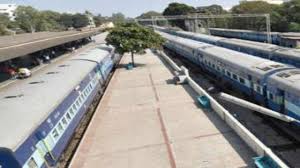Station cleaning: Railway Board asks DRMs to identify 10 areas which need special attention

In a major cleanliness push, the Railway Board has directed all Divisional Railway Managers (DRMs) to pinpoint 10 specific areas in each station that need special cleaning. This step is part of Indian Railways’ renewed effort to improve hygiene and enhance the passenger experience.
Local Action for a National Goal
Cleanliness isn’t just about sweeping platforms. The Railway Board now wants every DRM to take a fresh look at their stations and highlight 10 problem areas that often get ignored during regular cleaning.
These may include:
- Waiting rooms and concourses
- Foot overbridges and escalators
- Washrooms and urinals
- Platform corners and ends
- Dustbin areas
- Entry and exit gates
- Ticket counters
- Drainage channels
- Water booths
- Staff rest zones
Each division must choose zones that need regular deep cleaning based on usage, dirt build-up, and passenger complaints.
Moving Towards Clean and Smart Stations
The Railway Board’s plan links directly to its vision of developing smart and passenger-friendly stations. A clean station builds trust, reduces health risks, and adds to the overall travel experience.
Some areas within stations stay dirty even after routine cleaning. This new step helps divisions tackle those neglected spots. Instead of treating every station the same way, the Board wants tailored cleaning plans for each one.
Monthly Monitoring and Photo Evidence
To make sure the work gets done, DRMs must inspect the chosen areas regularly. They will also submit monthly reports with photographs showing improvements. These updates will feed into a centralized dashboard to track progress across India.
Officials may also involve public feedback tools like the “Swachh Rail Swachh Bharat” app. This lets passengers send photos or report dirty spots directly.
A senior official said, “We’re not just cleaning floors. We want escalator bases, drain sides, and vending corners cleaned properly and consistently.”
Cleaner Stations Mean Safer Travel
Clean stations don’t just look better — they’re safer too. Poor hygiene can lead to infections and discomfort, especially in crowded stations. Passengers also judge Indian Railways based on how clean platforms and facilities are.
A clean environment makes travelers feel respected and cared for. It’s especially important for business travelers, tourists, and families.
Technology to Play a Bigger Role
Some divisions already use smart cleaning tools like vacuum sweepers and sensor-controlled washrooms. Others may adopt machines for scrubbing floors, spraying disinfectants, or cleaning drains.
DRMs can recommend tech upgrades for tough areas. For example:
- Jet sprays for platforms
- Touchless systems in washrooms
- Fragrance dispensers in waiting rooms
- Floor-cleaning robots in busy zones
Inspired by Past Clean Station Rankings
Indian Railways has previously ranked stations for cleanliness. Jaipur, Mysuru, and Jodhpur often ranked among the best. These results came from focused efforts by the divisions.
Now, the Board wants similar improvements in smaller stations. Targeted attention on 10 areas may help poorly ranked stations improve their score.
Campaigns like Swachhta Pakhwada, which involved students and NGOs in clean-up drives, may also support this mission.
Stronger Contracts and Staff Participation
Contractors handling station cleaning will now work under stricter rules. Their payment and contract extensions will depend on how well they maintain the 10 priority areas.
Station masters and supervisors will join the identification process too. Their daily presence helps them spot areas that need more care. This also makes the entire system more accountable and transparent.
Better Cleanliness for 23 Million Passengers
Over 23 million people travel by train in India every day. Clean stations play a vital role in their comfort and safety. This new plan from the Railway Board pushes local managers to act, inspect, and report.
If followed properly, this approach will make stations cleaner, safer, and more welcoming. It will also strengthen Indian Railways’ reputation both within the country and abroad.






